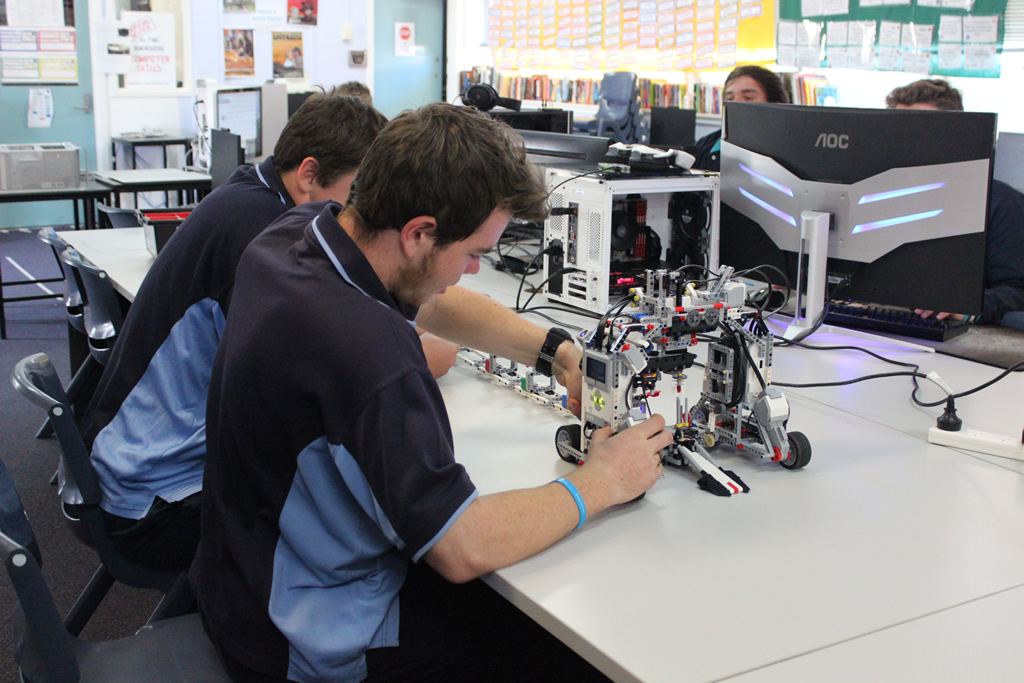Technologies enrich and impact on the lives of people and societies globally.
Society needs enterprising students who can make discerning decisions about the development and use of technologies, develop solutions to complex challenges and contribute to sustainable patterns of living.
Technologies can play an important role in transforming, restoring and sustaining societies and natural, managed and constructed environments. At Merredin College, we strive to encourage and develop enterprising individuals who can make discerning decisions about the development and use of technologies. We also encourage students to work both independently and collaboratively to develop solutions to complex challenges and contribute to sustainable patterns of living.
Technologies students are often required to plan and manage their work in collaborative settings and are assessed through creative design tasks which test students’ capacity to investigate, generate, produce and evaluate.
Primary Technologies
Merredin College has in place excellent infrastructure for providing students with access to current technology. All classrooms have an interactive whiteboard, a class iPads and access to a class set of iPad minis and a computer lab. All classes have an AppleTV to allow screen sharing of devices to the interactive whiteboard.
Junior primary classes have access to programmable ‘Beebot’ robots, code-a-pillars and Cubetto Robots to support the development of coding skills and Year 3 – Year 6 students have access to ‘Dash&Dot’ robots, Lego WeDo, Ozobots, Spheros and Micro:bits to further develop these skills.
Teachers utilise our Expeditions Kit to expose students to Virtual Reality experiences to complement their learning in other contexts.
Classroom teachers use ‘Seesaw” to share student driven digital portfolios with parents so that they know exactly what their child is producing in the classroom. The use of green screens has also become increasingly popular.
We have a scope and sequence to ensure skills for using technology are taught sequentially, including keyboard skills, and we have embedded the teaching of coding into this sequenced program.
Secondary Technologies
More About Each Context
Computing
The Year 7-10 Digital Technologies curriculum aims to enhance our students understanding of technologies and give them strategies to make informed choices about personal use. The curriculum has a focus on;
- E Safety
- Exploring digital systems, hardware and software
- Representing, collecting, managing and analysing data
- Designing and producing
- Simple programming language
- Creating solutions through collaborating and evaluating.
Home Economics
Home Economics provides students with an opportunity to explore the areas of textiles and cooking. Students plan, prepare, produce and evaluate a range of nutritious meals while learning how to confidently use multiple sewing machine functions to produce practical fabric designs.
Woodwork
Woodwork provides students with an opportunity to explore the material qualities of wood. Students design and produce a number of different products while learning how to safely and confidently use tools and machines for a variety of woodworking processes.
Metalwork
Students studying Year 10 metals will be given an opportunity to use a variety of hand and power tools safely and fabricate a variety of small metalwork projects. Students will be able to develop an awareness of the properties of different metals, the methods of cutting and joining metals following set procedures.
Senior secondary Technologies’ students can select from the following pathways:
Food Science and Technology
The Food Science and Technology General course provides opportunities for students to explore and develop food-related interests and skills. Food impacts on every aspect of daily life and is essential for maintaining overall health and wellbeing. Students organise, implement and manage production processes in a range of food environments and understand systems that regulate food availability, safety and quality. Knowledge of the sensory, physical, chemical and functional properties of food is applied in practical situations. Students investigate the food supply chain and value-adding techniques applied to food to meet consumer and producer requirements. Principles of dietary planning, adapting recipes, and processing techniques, are considered for specific nutritional needs of demographic groups. Occupational safety and health requirements, safe food handling practices, and a variety of processing techniques, are implemented to produce safe, quality food products. This course may enhance employability and career opportunities in areas that include nutrition, health, food and beverage manufacturing, food processing, community services, hospitality and retail.
Children, Family and the Community
The Children, Family and the Community General course focuses on factors that influence human development and the wellbeing of individuals, families and communities. Students explore the health of individuals and communities and the protective and preventative strategies that impact on growth and development. The engage in shared research, examine goal setting, self-management, decision making, communication and cooperation skills when creatin product, services or systems that will assist individuals or families and communities to achieve their needs and wants. Contemporary Australian issues or trend relating to families and communities at state and national level are examined in practical ways.
CERTIFICATE II in Applied Digital Technology
The Certificate II covers 14 units encompassing;
- General computer management and maintenance
- Occupational Health and Safety
- Workplace and business applications
- Software and Hardware
- Diagnostics and Virus detection and protection.
CERTIFICATE III in Information Technology
The Certificate III offers students the opportunity to develop and practice the skills and knowledge required to in the workplace. There are 17 units that must be completed dealing with a range of competencies including;
- Sustainable workplace practice
- Installing and optimising operating systems
- Produce digital images for the web
- Providing system administration and IT advice to clients
- Connecting, maintaining and replacing hardware
- Operating software applications and creating user documentation.
Please explore Learning Areas – Vocational Education and Training (VET) for more information on Certificates courses.

